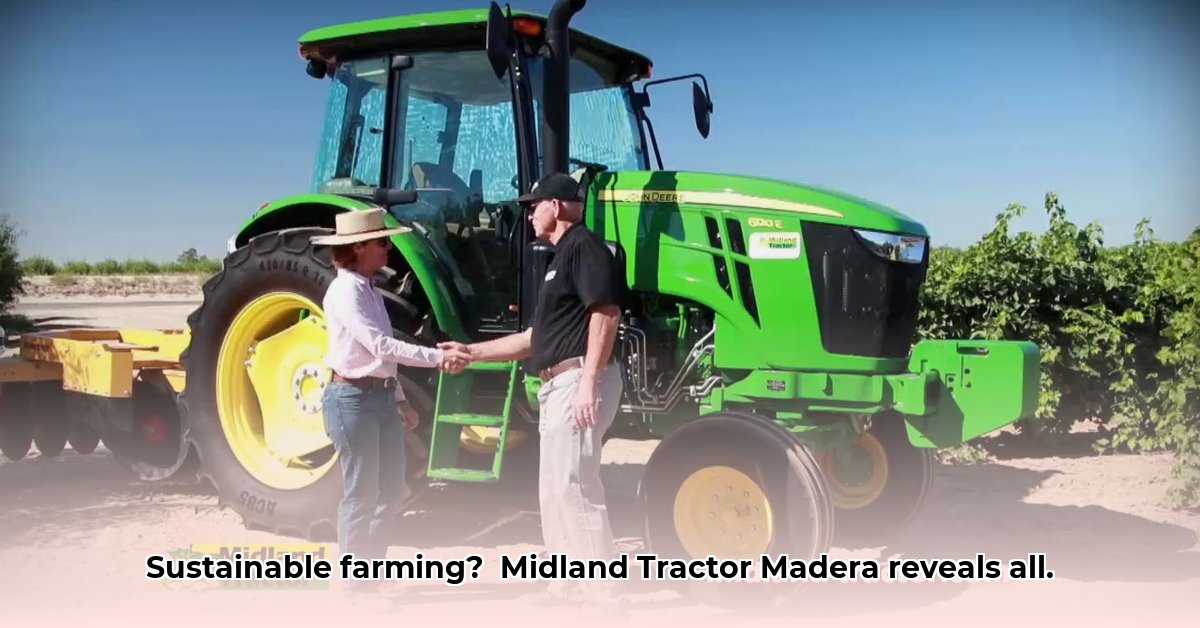
A Case Study in Sustainable Agricultural Practices
Midland Tractor Madera, a prominent agricultural equipment supplier serving the region for over four decades, has established a strong reputation for providing a wide range of machinery and reliable customer service, including a convenient parts drop-off program. However, the modern agricultural landscape demands a focus on sustainability. This case study analyzes Midland Tractor's current practices, identifies key areas for improvement, and proposes a comprehensive roadmap for sustainable growth. It explores the complexities of measuring environmental impact, the importance of stakeholder engagement, and the long-term benefits of integrating sustainability into core business operations.
Current Practices and Areas for Improvement
While Midland Tractor's long history and customer-centric approach are commendable, their commitment to sustainability requires a more concrete and publicly visible framework. Currently, the company lacks readily available, quantifiable metrics to gauge its environmental impact. Furthermore, details regarding grower education programs, crucial for promoting sustainable farming practices, are limited. These gaps present significant opportunities for improvement. Addressing these shortcomings will enhance Midland's brand image, attract environmentally conscious investors, and solidify its leadership position within the agricultural sector. What specific steps can Midland take to move beyond a reputation built solely on legacy and customer service?
Building a Sustainable Business Model: A Practical Roadmap
Integrating sustainability requires a comprehensive, multi-faceted strategy that goes beyond incremental change. The following steps provide a practical roadmap:
Conduct a Comprehensive Environmental Audit: A thorough audit, using a recognized framework such as the Global Reporting Initiative (GRI) standards, is crucial. This should encompass energy consumption, waste generation, and supply chain impacts—from manufacturing to disposal—to quantify the company's overall environmental footprint. The goal is to identify precise areas for improvement and establish a baseline for future progress. How can Midland ensure the audit’s thoroughness and eliminate bias?
Define Achievable SMART Goals: Vague goals are ineffective. Midland must establish Specific, Measurable, Achievable, Relevant, and Time-bound (SMART) goals. For example, targeting a 20% reduction in greenhouse gas emissions within five years provides a clear benchmark for progress and accountability. How will Midland track and report on progress against these goals?
Empower Growers Through Education: Invest in robust grower education programs. These programs should extend beyond equipment demonstrations to encompass in-depth training on sustainable farming techniques. Strategic partnerships with agricultural universities and research institutions can provide vital expertise and access to the latest research. Such impactful training can build grower loyalty and solidify Midland’s commitment to sustainable agriculture. How can Midland ensure its training programs are practical, effective, and accessible to all growers?
Foster Collaboration with Key Stakeholders: Open communication is critical. Regular dialogues with growers should address their needs and challenges. Transparency with investors regarding sustainability initiatives builds trust and assures long-term viability. Proactive engagement with industry regulators demonstrates compliance and commitment to responsible practices. How can Midland best facilitate this multi-stakeholder collaboration to ensure shared goals and success?
Transparency and Public Reporting: Regularly publish detailed sustainability reports. This transparency builds credibility and demonstrates accountability. Seeking third-party verification of sustainability claims further enhances trust and opens opportunities for green financing. How can Midland ensure the accuracy and credibility of its sustainability reports?
Stakeholder Engagement: A Collaborative Approach to Sustainability
Midland Tractor's success hinges on collaboration among key stakeholders. The following table outlines actions and expected outcomes for each:
| Stakeholder | Actions | Expected Outcomes |
|---|---|---|
| Growers | Adopt precision farming techniques; participate in educational programs | Optimized fuel use, reduced soil compaction, increased yields |
| Midland Tractor | Invest in R&D for sustainable technologies; transparent reporting | Enhanced brand reputation, improved product competitiveness |
| Regulators | Implement stricter emissions standards; offer financial incentives | Cleaner technology adoption, reduced environmental impact |
| Investors | Demand for ESG (environmental, social, and governance) reporting | Increased investment in sustainable agricultural technologies |
Measuring Environmental Impact: A Detailed Approach
To comprehensively understand Midland Tractor's environmental footprint, a multi-faceted approach is needed:
Comprehensive Sustainability Audit: Assess fuel consumption, greenhouse gas (GHG) emissions, soil compaction, and water usage throughout the entire product lifecycle.
Develop Clear Metrics: Define SMART goals for reducing environmental impact, including targets for GHG reductions, fuel efficiency improvements, and minimized soil compaction.
Lifecycle Assessment (LCA): Conduct LCAs on key tractor models using tools like SimaPro or GaBi to analyze environmental burdens from raw material extraction to end-of-life disposal.
Data Collection and Analysis: Utilize sensors to collect real-time data on fuel consumption, engine performance, and operational parameters to identify efficiency improvements and minimize environmental impacts.
Implement Mitigation Strategies: Develop and implement actionable plans based on audit results and data analysis to improve fuel efficiency, reduce emissions, and minimize soil compaction. This might include investments in alternative fuels and precision agriculture technologies.
The Investor Perspective: A Sustainable Investment
For investors, sustainability is no longer optional; it's a critical factor influencing investment decisions. Comprehensive ESG reporting detailing Midland’s sustainability performance will attract investors focused on environmentally and socially responsible companies. This not only enhances brand reputation but also opens access to green financing, enabling further investment in sustainability programs. How can Midland tailor its ESG reporting to attract a wider range of socially responsible investors?
Conclusion: Embracing Sustainability for Long-Term Success
In today's evolving agricultural landscape, sustainability is not a trend; it's a necessity for long-term viability. By fully integrating sustainability into its operations, Midland Tractor Madera can ensure its continued success and contribute to a healthier planet. Continuous improvement is key, and adapting strategies as new knowledge emerges is crucial for maintaining competitiveness and leadership in the industry.